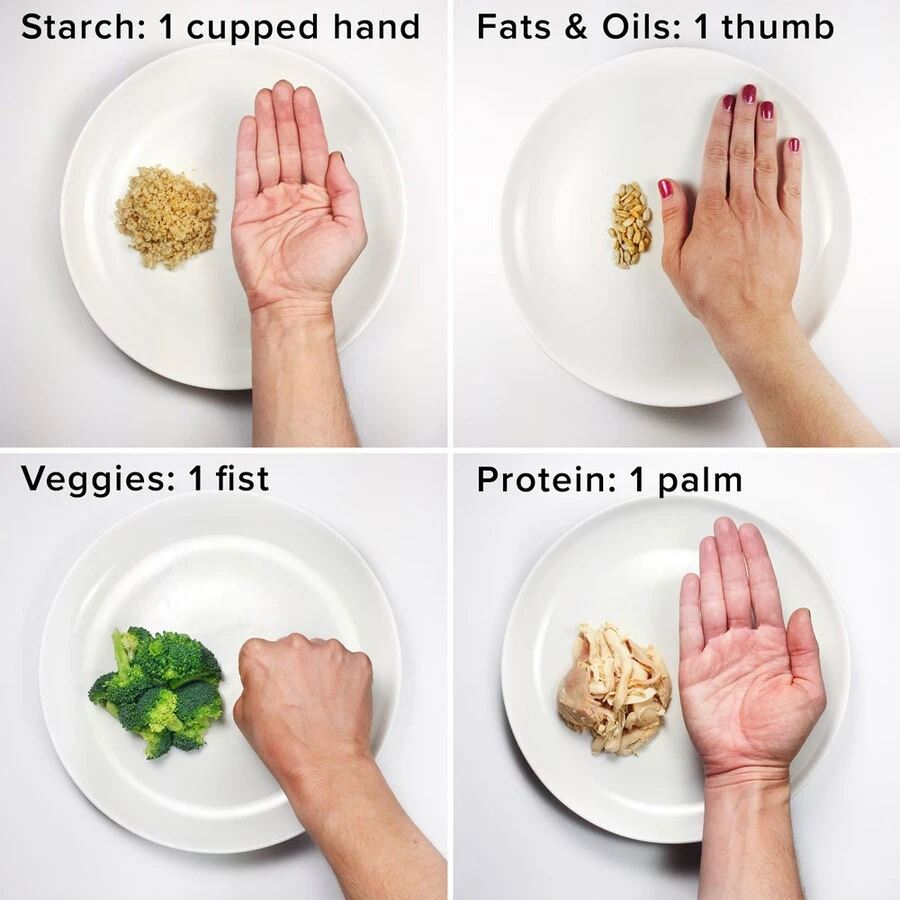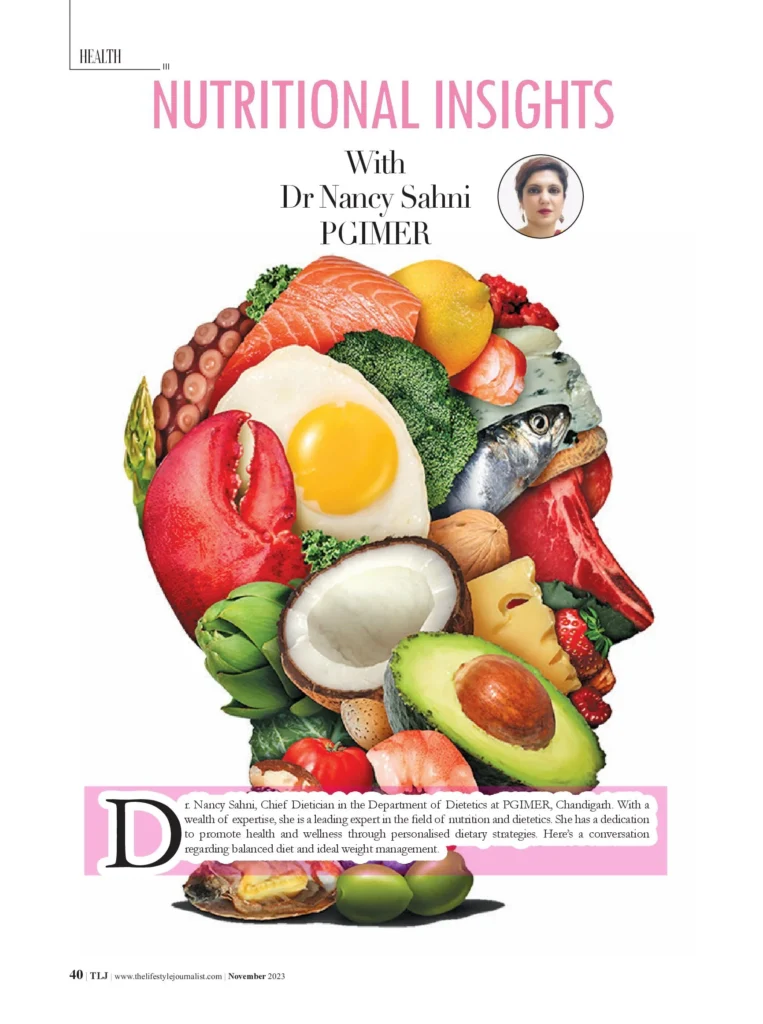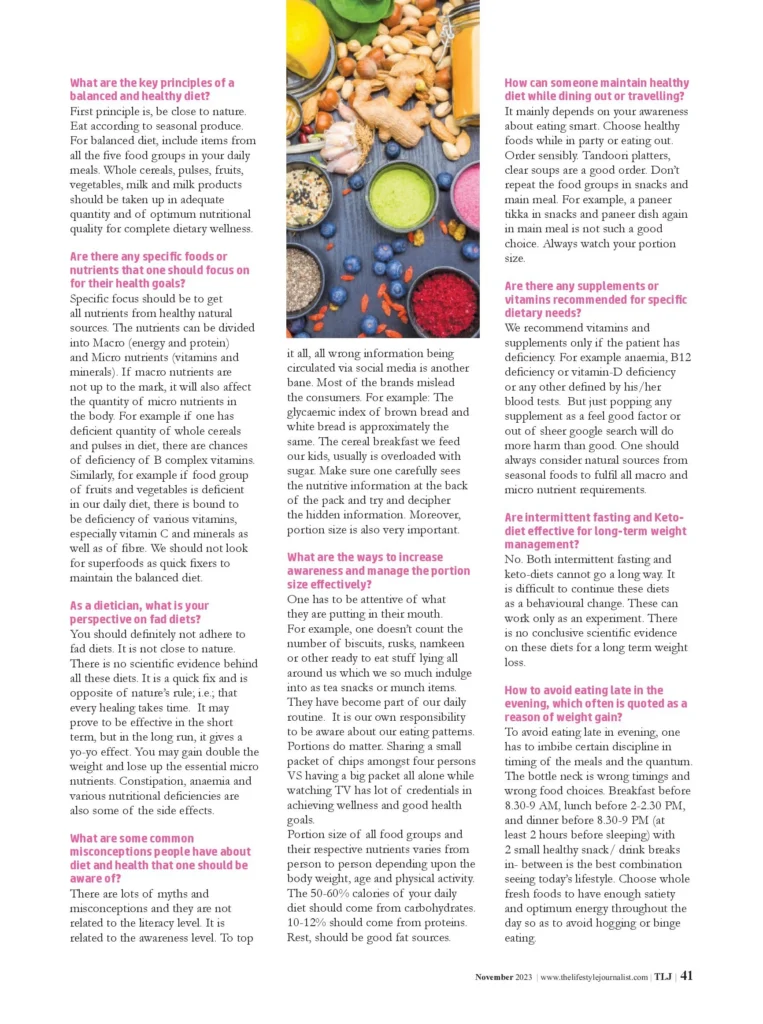With Dr Nancy Sahni PGIMER

Dr. Nancy Sahni, Chief Dietician in the Department of Dietetics at PGIMER, Chandigarh. With a
wealth of expertise, she is a leading expert in the field of nutrition and dietetics. She has a dedication
to promote health and wellness through personalised dietary strategies. Here’s a conversation regarding balanced diet and ideal weight management.
What are the key principles of a balanced and healthy diet?
First principle is, be close to nature. Eat according to seasonal produce. For balanced diet, include items from all the five food groups in your dailymeals. Whole cereals, pulses, fruits, vegetables, milk and milk products should be taken up in adequate quantity and of optimum nutritional quality for complete dietary wellness.

Are there any specific foods or nutrients that one should focus on for their health goals?
Specific focus should be to get all nutrients from healthy natural sources. The nutrients can be divided into Macro (energy and protein) and Micro nutrients (vitamins and minerals). If macro nutrients are not up to the mark, it will also affect the quantity of micro nutrients inthe body. For example if one has deficient quantity of whole cereals
and pulses in diet, there are chances of deficiency of B complex vitamins. Similarly, for example if food group
of fruits and vegetables is deficient in our daily diet, there is bound to be deficiency of various vitamins, especially vitamin C and minerals as well as of fibre. We should not look for superfoods as quick fixers to maintain the balanced diet.
As a dietician, what is your perspective on fad diets?
You should definitely not adhere to fad diets. It is not close to nature. There is no scientific evidence behind all these diets. It is a quick fix and is opposite of nature’s rule; i.e.; that every healing takes time. It may prove to be effective in the shortterm, but in the long run, it gives a yo-yo effect. You may gain double the weight and lose up the essential micro nutrients. Constipation, anaemia and various nutritional deficiencies are also some of the side effects.
What are some common misconceptions people have about diet and health that one should be aware of?
There are lots of myths and misconceptions and they are not related to the literacy level. It is
related to the awareness level. To top it all, all wrong information being circulated via social media is another bane. Most of the brands mislead the consumers. For example: The glycaemic index of brown bread and white bread is approximately the same. The cereal breakfast we feed our kids, usually is overloaded with sugar. Make sure one carefully sees the nutritive information at the back of the pack and try and decipher the hidden information. Moreover, portion size is also very important.
What are the ways to increase awareness and manage the portion size effectively?
One has to be attentive of what they are putting in their mouth. For example, one doesn’t count the number of biscuits, rusks, namkeenor other ready to eat stuff lying all around us which we so much indulge into as tea snacks or munch items. They have become part of our daily routine. It is our own responsibility to be aware about our eating patterns. Portions do matter. Sharing a smallpacket of chips amongst four persons VS having a big packet all alone while watching TV has lot of credentials in achieving wellness and good health goals.Portion size of all food groups and their respective nutrients varies from person to person depending upon the body weight, age and physical activity. The 50-60% calories of your daily diet should come from carbohydrates. 10-12% should come from proteins. Rest, should be good fat sources.

How can someone maintain healthy diet while dining out or travelling?
It mainly depends on your awareness about eating smart. Choose healthy foods while in party or eating out. Order sensibly. Tandoori platters, clear soups are a good order. Don’t repeat the food groups in snacks and mainmeal. For example, a paneer tikka in snacks and paneer dish again in main meal is not such a good choice. Always watch your portion size.
Are there any supplements or vitamins recommended for specific dietary needs?
We recommend vitamins and supplements only if the patient has deficiency. For example anaemia, B12 deficiency or vitamin-D deficiency or any other defined by his/her blood tests. But just popping any supplement as a feel good factor or out of sheer google search will do more harm than good. One should always consider natural sources from seasonal foods to fulfil all macro and micro nutrient requirements.
Are intermittent fasting and Keto diet effective for long-term weight management?
No. Both intermittent fasting and keto-diets cannot go a long way. It is difficult to continue these diets as a behavioural change. These can work only as an experiment. There is no conclusive scientific evidence on these diets for a long term weight loss.
How to avoid eating late in the evening, which often is quoted as a reason of weight gain?
To avoid eating late in evening, one has to imbibe certain discipline in timing of the meals and the quantum. The bottle neck is wrong timings and wrong food choices. Breakfast before 8.30-9 AM, lunch before 2-2.30 PM,
and dinner before 8.30-9 PM (at least 2 hours before sleeping) with 2 small healthy snack/ drink breaks in- between is the best combination seeing today’s lifestyle. Choose whole fresh foods to have enough satiety and optimum energy throughout the day so as to avoid hogging or binge eating.



